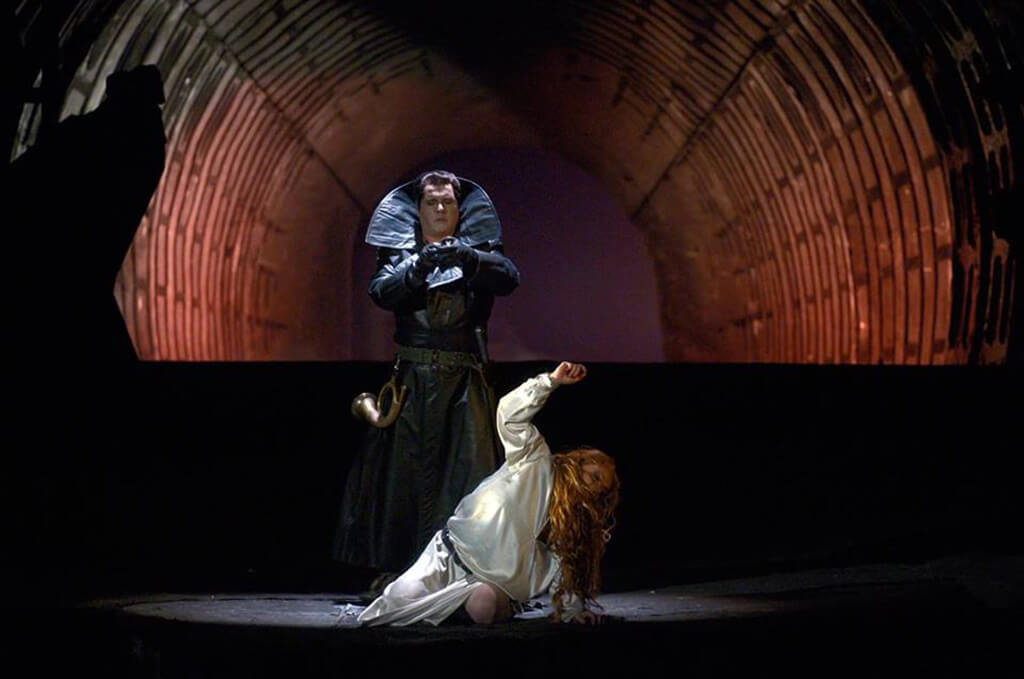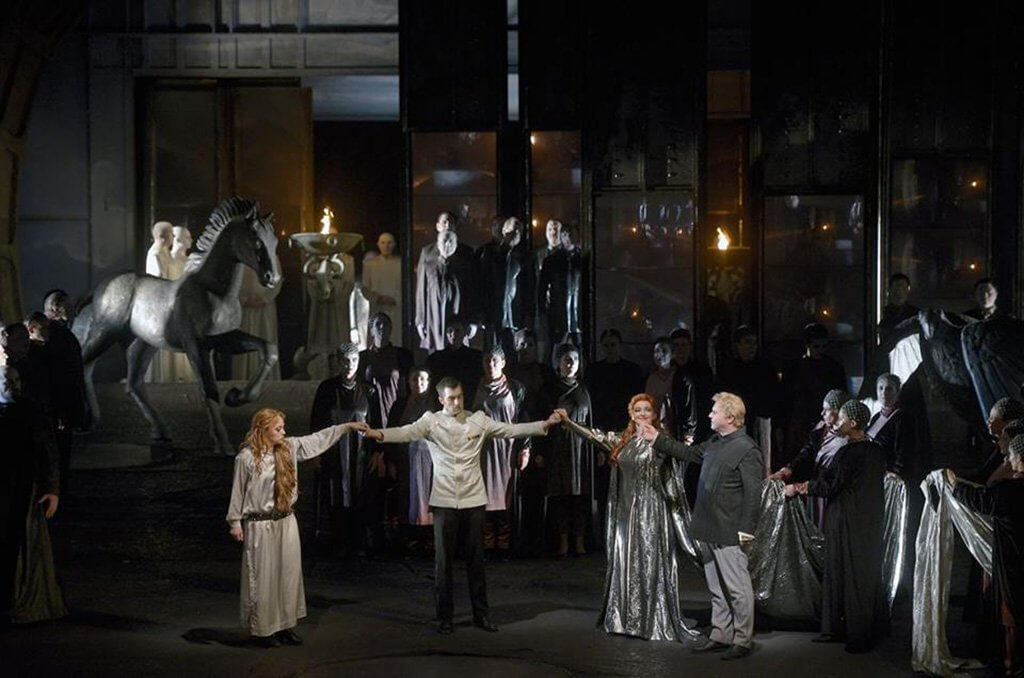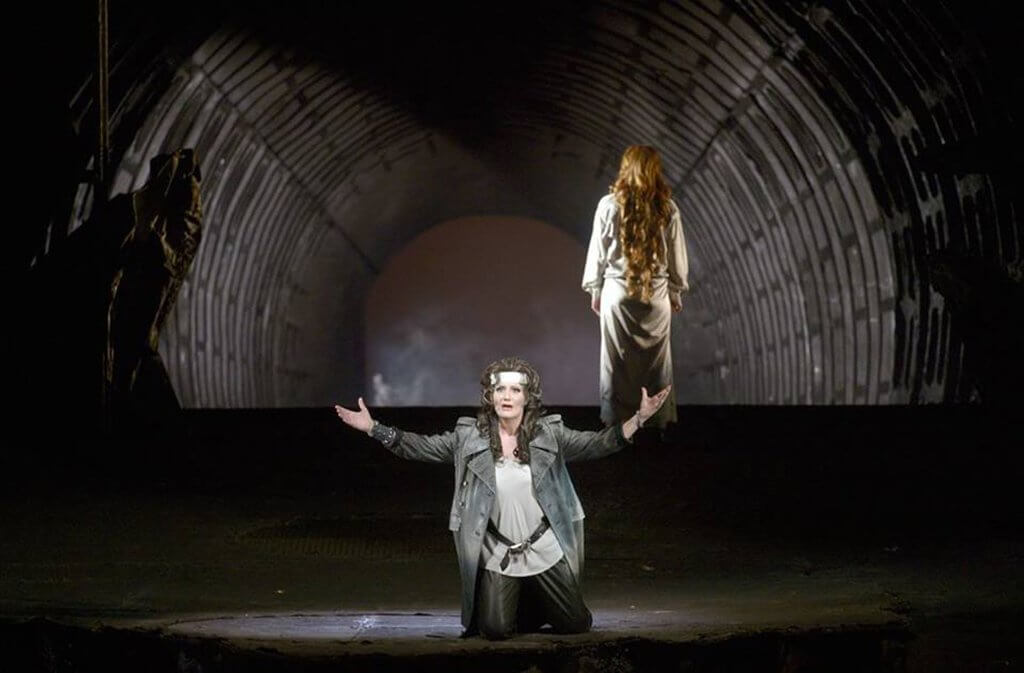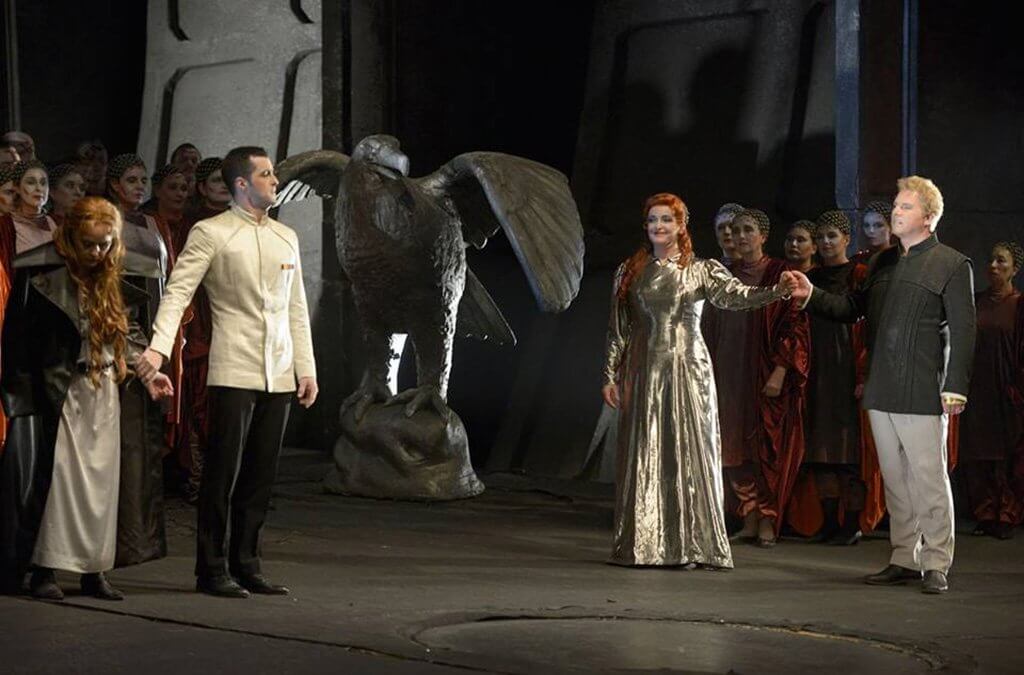
- SCRUTINY | Opera Atelier’s All Is Love Makes Triumphal Return - April 15, 2024
- SCRUTINY | From The Heart: Ema Nikolovska And Charles Richard-Hamelin Offer Unique Program At Koerner Hall - March 26, 2024
- SCRUTINY | The Glenn Gould School Spring Opera Presents A Superb Dialogues Des Carmélites - March 22, 2024
Wagner: Götterdämmerung. Evelyn Herlitzius, Stefan Vinke, Albert Pesendorfer, Seth Carico, Ricarda Merbeth, Daniela Sindram, Werner Can Mechelen, Ronnita Miller, Seyoung Park, Martina Welschenbach, Christina Sidak, Annika Schlicht. Donald Runnicles, conductor. Das Orchester der Deutschen Oper Berlin. Apr 17, 2017.
All good things must come to an end, as they say. Just before 2200 hours last Monday at the Deutsche Oper, the last notes of the Immolation Scene from the resplendent orchestra faded into thin air. Instead of applause, that was a long, long silence. It wasn’t as if conductor Donald Runnicles held up his hand to stop the eager fans from showing their appreciation. It was an entirely voluntary, collective moment of meditation, of reflection on what had transpired the past five days. After what seemed like an eternity, the house erupted into tumultuous applause.
There were thunderous ovations for all the artists, particularly the principals. Stefan Vinke (Siegfried) and Evelyn Herlitzius (Brunnhilde) were received ecstatically. Donald Runnicles was given a hero’s welcome. The orchestra joined everyone on stage, given countless bravos. Bouquets for all the singers and the conductor — nice to see the men get flowers too! Lots of audience members holding up cameras to capture the magical moments. This went on for a long time, about twenty minutes. When I decided to call it a day, they were still going at it. Typical of German houses, even if a half dozen people continue to applaud, the artists will still come out.
It would not be an exaggeration to say the much heralded Götz Friedrich Ring Cycle went out in a blaze of glory. Without question, it was an estimable musical success, with Donald Runnicles at the helm. He conducted the score with affection, never dawdled but never in too big a hurry, always careful to bring out the details, always giving space to allow the singers to do their best, while maintaining control and attentive of the overall arc of the piece. His conducting was masterful, and it bodes well for the revival of the Francesca Zambello production of the Ring at San Francisco Opera in the summer of 2018, once again with Evelyn Herlitzius as Brunnhilde.
The German soprano is to me the great Elektra of our time, combining her trademark intensity with searing vocalism. However, Brunnhilde is longer, more multi-dimensional, with more character development over a span of three segments. I had never seen her Brunnhilde until now, and she made a believer out of me. At her best in Act Two, her Brunnhilde is a woman wronged, full of fury, hell bent on vengeance, an Elektra in Brunnhilde’s clothing. Vocally not note-perfect, but fearless and exciting just the same. She paced herself well, and had plenty of reserve for a fine Immolation Scene.
Matching her note for note was the excellent Siegfried of Stefan Vinke, once again his indefatigable self, with a trumpet for a voice, fearless in the high register. The mature Siegfried has three high C’s – at the end of “Zu neuen Taten” in Act One, a rapid passage in Act Two briefly touching a C, and a long held one in Act 3 shortly before his death. Vinke sang all three marvelously. His characterization was also uncommonly believable, yes, even endearing sometimes! Albert Pesendorfer from the Ensemble replaced the great Ain Anger as Hagen in this cycle. It’s not easy to follow the Estonian, but Pesendorfer held his own.
Seth Carico, with his slim frame and lyric baritone was a rather precious Gunther, an interesting characterization. There was a lot of touchy-feely interaction with Gutrune (sung by Ricarda Merberth), the subtext of some incestuous relationships between the two. Merbeth, a fine lyric soprano who sang the Siegfried Brunnhilde two nights earlier, had little to do in this ungrateful role. Due to the illness of Irene Roberts (Second Norn), mezzo Daniela Sindram did double duty, as a terrific Waltraute as well singing Second Norn by the side of the stage with a music stand, while another singer mimed the role.
The tunnel set was modified to accommodate the Gibichung Hall in Act Two and final scene of Act Three. Expert lighting helped shape the drama in Act Three, which is always difficult to stage. And not all the directorial touches were successful — particularly lame was Hagen’s last moves at the end. The Deutsche Oper male chorus was its sonorous self in the Call of the Vassals. The Orchestra played its heart out for Runnicles, with a very impressive Funeral Music. One could quibble here and there, but overall it was a very satisfying Ring Journey. Now we can look forward to the next chapter with Stefan Herheim, the Norwegian Regie, to create his first Ring Cycle.
For more REVIEWS, click HERE.
#LUDWIGVAN
Want more updates on Toronto-centric classical music news and reviews before anyone else finds out? Follow us on Facebook or Twitter for all the latest.
- SCRUTINY | Opera Atelier’s All Is Love Makes Triumphal Return - April 15, 2024
- SCRUTINY | From The Heart: Ema Nikolovska And Charles Richard-Hamelin Offer Unique Program At Koerner Hall - March 26, 2024
- SCRUTINY | The Glenn Gould School Spring Opera Presents A Superb Dialogues Des Carmélites - March 22, 2024






